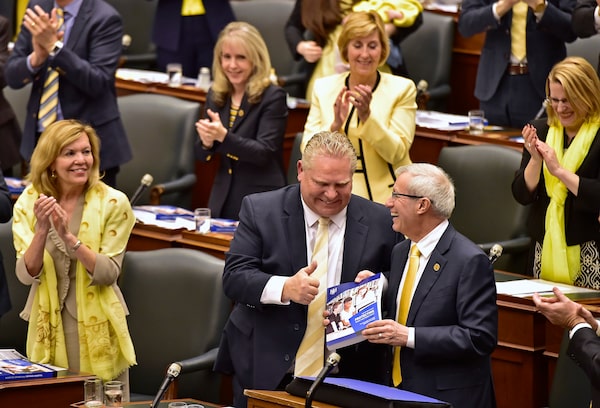
Paul Calandra, the Government House Leader, says the PCs will abide by the ‘spirit’ of an eight-page memo on civility the Speaker sent out in the summer that singled out the government’s insistence on frequent standing ovations. (File Photo).Frank Gunn/The Canadian Press
Ontario Premier Doug Ford and his Progressive Conservative government have pledged to be on better behaviour when the legislature reopens on Monday as part of a strategy to strike a new, more conciliatory tone.
MPPs are returning to Queen’s Park amid tense labour talks with the province’s teacher unions – whom the Premier has previously called “thugs” – and which are due to hold strike votes within days. But the PC government, from Mr. Ford on down, promises to make an effort to keep the thermostat low.
However, one of the key bills on the agenda is a contentious plan to legislate wage caps of 1 per cent on public sector workers – and a union-sponsored protest is scheduled for the front lawn of Queen’s Park on Monday.
Paul Calandra, the former federal MP who is Mr. Ford’s House Leader, said last week the government will act a little differently in the legislature. He said the PCs will abide by the “spirit” of an eight-page memo on civility the Speaker sent out in the summer that singled out the government’s insistence on frequent standing ovations. But he cautions that Question Period will not turn into a tea party.
“I don’t want to leave any illusions. When members are passionate in debate, I think that’s good for the legislature. It’s good,” Mr. Calandra said. “They don’t pay us to sit here and be bumps on a log.”
The legislature has been on a break for five months, and Mr. Ford kept a low profile during the federal election campaign, after a rocky first year in which the Premier lost his chief of staff and retreated on several issues.
A senior PC source, to whom The Globe and Mail has granted confidentiality because they were not authorized to speak publicly, said the government’s strategy is to emphasize governing, rather than a campaign-like approach.
NDP Opposition Leader Andrea Horwath told reporters last week she’s not sure what tone to expect when the legislature returns, no matter what some on the government side have promised.
“The biggest change that’s happened in terms of how the tenor of the Question Period process unfolds has come as a result of the current government," Ms. Horwath said. “So I think Mr. Ford and his team need to do some thinking.”
The Ford government shut down the legislature in June, launching a 144-day break that ends only a week after the Oct. 21 federal election. For months, Mr. Ford’s cabinet, which was shuffled in June after a year in office, has been backtracking on spending cuts and other controversies that had moved the government’s poll numbers downward. As the fall federal election campaign got under way, Mr. Ford stayed well out of the spotlight, even as Prime Minister Justin Trudeau tried to link the Premier’s spending cuts to federal Conservative Leader Andrew Scheer.
One senior Progressive Conservative source said the long hiatus was as much about resetting the government’s image in Ontario as it was about trying to avoid having Mr. Ford damage Mr. Scheer’s chances. The Globe granted confidentiality to the source to speak about internal matters.
The government has also ratcheted back the rhetoric on one of its central campaign planks: Allowing the sale of beer in corner stores. Talks had been held with the big brewers that own the near-monopoly Beer Store retail outlet on its 10-year contract with the government, which limits expanding beer sales outside its doors. But Mr. Calandra told reporters this week a bill that would tear up Ontario’s deal with the Beer Store and insulate the government from any resulting lawsuit was not on the legislature’s immediate priority list.
In addition to toning down arguments in the House, Mr. Ford has repeatedly said in his public comments since the re-election of the federal Liberals that he also wants to work collaboratively with other governments – although he says his legal challenge of Mr. Trudeau’s carbon tax will proceed.
Mr. Ford’s Transportation Minister, Caroline Mulroney, recently struck a deal with Toronto Mayor John Tory to pull back on Ontario’s plan to take over the city’s existing subway system in exchange for Mr. Tory’s blessing for the province’s proposed Ontario Line subway.
Ms. Mulroney told reporters last week it was important to set a “collaborative tone,” and that she would work with other levels of government to get transit built.
 Jeff Gray
Jeff Gray Laura Stone
Laura Stone